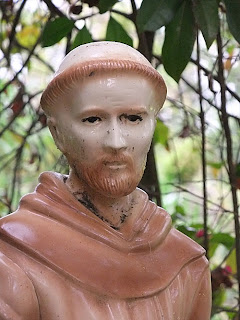Conformity of Love: Blogging the Lectionary
Who do you say I am? (Matthew 16:15)
That's from the lectionary of three weeks ago that I never got around to writing about. This might end up a bit of a series, personal reflections on these questions. I invite you to join me in them. (Take your time with them. I have.)
- Who do I say Jesus is? (And the corollary is: and do my actions reflect that?)
- What does the Cross mean to me?
- Why the Church?
Who do I say Jesus is?
And is it different from who I say God is? (Inasmuch as I know who God is anyway...)
I say Jesus is Beloved and Lover. What I mean is that Jesus as the Son of the living God, is the embodiment of God's unconditional love (chesed - loving kindness). He loves us, he listens to us, he comforts us.
I was going to say more than this, share my history of how my view of Jesus has changed over the years: from this divine guy who pats the heads of children but is distant, to the brief period where I claimed him as mortal prophet only but worth following, and to where I am now, currently. And it’s almost like I know both less and more about Jesus, through study of the Gospels and in my own experiences. But I trust more. (If not completely yet.)
Do I show my belief in Jesus as Beloved and Lover in who I am? In my actions?
Probably not. Probably more than I think I do. And that’s what today’s gospel from Matthew is about. (Matthew 18:15-20)
It has been bothering me all week, this gospel about confronting sinners and gathering the church — because of the stories of ostracism and how victims of abuse are the ones who end up outside their community.
 Not one commentary that I read this past week addressed this. It was all about church conflict and how to handle it, albeit with some recognition that this isn’t a cookie-cutter, or the only, solution. Matthew isn’t talking about how to negotiate the conflict over whether there should be all white flowers or all red flowers for Christmas, or whether the rectory should be kept or sold, or if one’s theology is right or wrong.
Not one commentary that I read this past week addressed this. It was all about church conflict and how to handle it, albeit with some recognition that this isn’t a cookie-cutter, or the only, solution. Matthew isn’t talking about how to negotiate the conflict over whether there should be all white flowers or all red flowers for Christmas, or whether the rectory should be kept or sold, or if one’s theology is right or wrong.
He’s talking about relationships. Relationships that make up a community. It’s not the issues, it’s the people.
Last night, my husband and I watched “Divergent”, the movie about a girl who doesn’t fit in to any of the factions and who may end up Factionless, without community, without family, as a result. While watching the movie, I did think that the Factionless are actually a faction and could pull it together. (Maybe I should read the books.) Ultimately, “Divergent” is about the dangers of conformity: don’t look in a mirror, accept your orders, etc.
And I think if Matthew’s community and Jesus’ disciples had a place in this post-apocalyptic world, their conformity would be that of love. Which I very much suspect would put them square with the Factionless and the Divergent, because love is all the virtues of each of the factions rolled into one: kindness, truth-speakers, putting others first, even dauntless with their courage and leaps of faith.
A conformity of love.
Not a conformity of shaming.
Not a conformity of power-wrangling.
Not a conformity of ostracism.
Not a conformity of fear.
A conformity of love.
In Matthew 18:17, Jesus says: "if the offender refuses to listen even to the church, let such a one be to you as a Gentile and a tax collector."
And how was Jesus with Gentiles and tax collectors? He loved them, he ate with them, he talked with them. Sin is breaking relationship. Jesus is about restoring relationship.
But what do you do about murderers and abusers and … and … ? This is where I get stuck. How do you restore relationship with those who destroy them?
What this gospel makes clear is that it is not up to you or I alone. There’s a community. God is among us and within us. I think it also helps that relationship is a two-way street and it takes two to agree to a right relationship, but beyond that I just don’t have any answers.
Do you? (Please post in comments if so. I think I have managed to turn threaded comments on which should still work even if you post anonymously. Let me know if you have issues.)


I hadn't made the connection between Jesus saying to treat them as a tax collector when He always ate with tax collectors. This is why I love your posts - so intriguing.
ReplyDelete